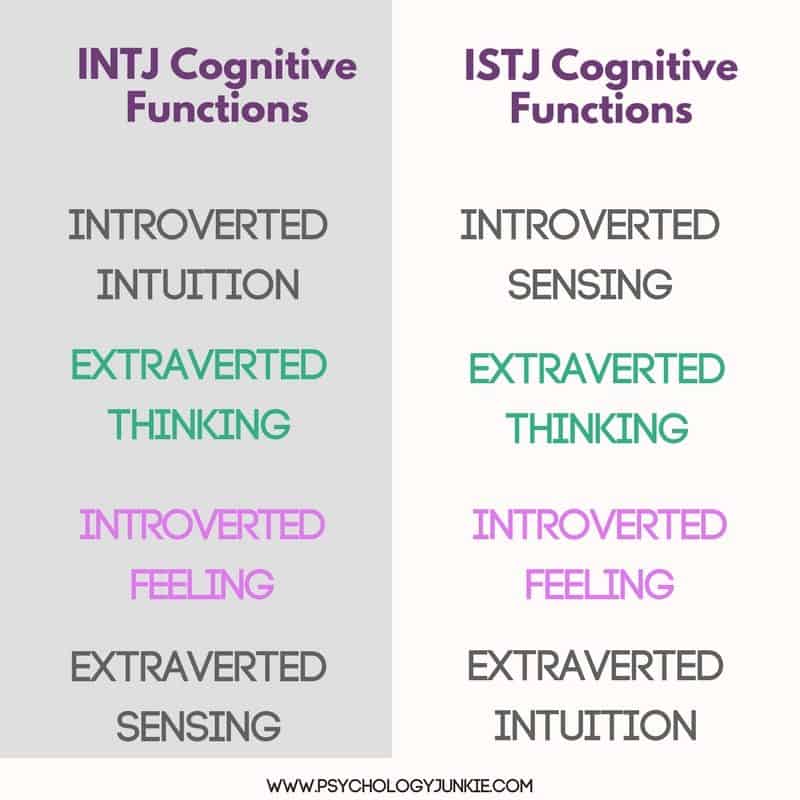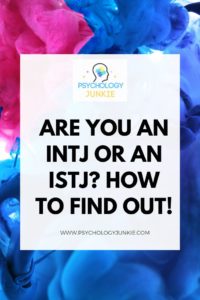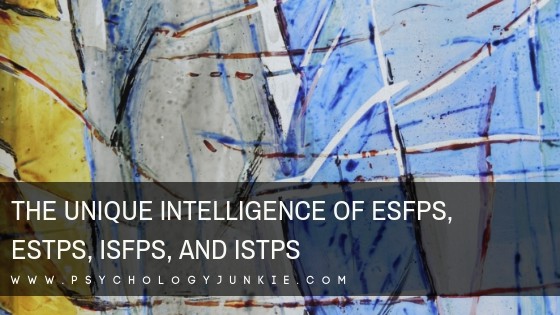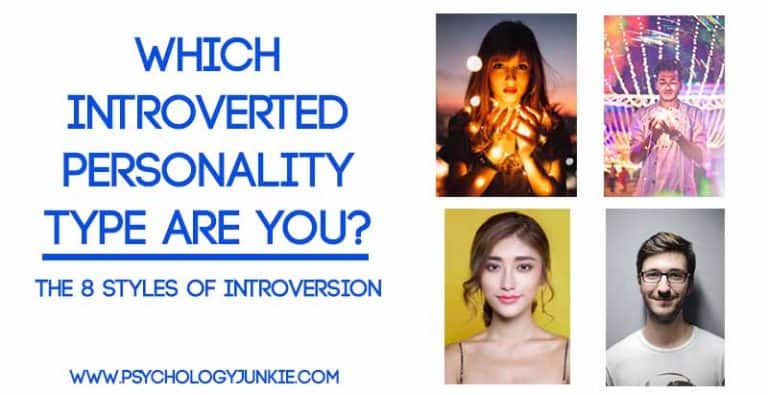ISTJ vs INTJ: Which One Are You?
The ISTJ vs INTJ dilemma stumps many people who are trying to discern their personality type. Many, many ISTJs mistype as INTJs and wind up feeling confused when they read articles that don’t resonate with them. I know how frustrating that can be! I hope this article can make clarifying your type easier.
Not sure what your personality type is? Take our new personality questionnaire here. Or you can take the official MBTI® here.

Why There Are So Many ISTJ vs INTJ Mistypes
Most online tests rely on the letter dichotomies (I/E, S/N, T/F, J/P) to type someone. They don’t focus on the cognitive functions, which are the foundation of personality type. Because of this, if someone scores just a little higher on one dichotomy than another the online test will push out a possibly inaccurate result. This happens often with the S/N and J/P preferences.
Another reason that online tests mistype people is that most tests have an intuitive bias. They assume certain words, like ‘possibilities’, ‘imagination’, and ‘deep’ apply only to intuitives, when in fact sensors can also enjoy possibilities, be imaginative, and enjoy deep conversation.
Example:
John Smith is an ISTJ who is 34-years-old. He works as a bank executive, but during his free time, he enjoys building furniture in his workshop. He also loves computers and has spent a lot of time trying to create customized desktops for his friends and family members. He enjoys watching Star Wars and reading Isaac Asimov. He’s starting to think more about the meaning of his life and what kind of legacy he wants to leave behind for his young children.
One day, John sits down at the computer and takes the 16 personalities online test. The test asks him to weigh in on statements like “You rarely do something just out of sheer curiosity”, or “Your mind is always buzzing with unexplored ideas and plans”. John thinks about how curious he is about how machines work or how he enjoys experimenting with computers to see if he can build his own. He thinks about how excited he is to create new furniture in his workshop. He thinks about how he’d like to turn his love of carpentry into a business. He nods to himself. Yes! His mind is always buzzing with unexplored ideas and plans. Yes, he is very curious! He selects ‘Strongly Agree’ when he takes the test.
What John doesn’t realize is that 16 personalities asked those questions to define a preference for sensing or intuition. Those questions triggered an intuition preference. As a result, John gets an INTJ result. There are many things that resonate with John about the INTJ type description. He’s logical, objective, hard-working, private, reserved, intellectual. So he’s happy with that type for a long time.
Two years later John starts to read more into the INTJ type, and he realizes he’s not really sure how he uses Introverted Intuition (Ni). Sure, he gets hunches from time to time, but it isn’t a driving force in his life. He doesn’t think in symbols or metaphors, and his conversation tends to be on the literal side. He prides himself on being down-to-earth. These qualities don’t seem to match up with the abstract/symbolic thinking of the INTJ. Is he mistyped? After spending a few months exploring the cognitive functions in-depth, he realizes he’s actually an ISTJ.
Not sure what your personality type is? Take our new personality questionnaire here. Or you can take the official MBTI® here.
What INTJs and ISTJs Have in Common
INTJs and ISTJs share two cognitive functions. You can see these in the graphic below:
INTJs and ISTJs both have auxiliary Extraverted Thinking (Te). This means that they will both make decisions using impersonal analysis, objective logic, and by looking at pros and cons. They love structure, organizing tasks, and having a plan. Both types are pathfinders, with a desire to create a logical flow to their life and stay on the right path without a lot of distraction.
INTJs and ISTJs both have tertiary Introverted Feeling (Fi). This means that they will both have a strong set of values that they live by. While they may appear stoic and reserved on the outside, they have a more sensitive inner core and feel passionately for specific causes.
And then there are the preferences. INTJs and ISTJs both have a preference for introversion; they will both want to reflect before speaking and consider before making a decision. They will both try to be organized and methodical in their projects and plans.
How INTJs and ISTJs Perceive Differently
ISTJs use Introverted Sensing (Si). Si thinks about and sees the details. It is concerned with provable facts and the tried-and-true technique. ISTJs are practical, down-to-earth, and focused on realistic objectives and problems. Si gives the ISTJ a fondness for recalling past events in detail. They enjoy reflecting on their favorite memories, and they have a fondness for routine and stability. They like knowing what will happen, what to expect, and they tend to lead fairly consistent lives.
ISTJs map out the future in a practical way. They like to know how to create a good life for their family, for their children, grandchildren, and great-grandchildren. Their plans usually involve tangible realities; putting together a will, saving for a new house, building a workshop, doing something that has a utilitarian result.
Some Facts About ISTJs:
- They are down-to-earth and outwardly matter-of-fact.
- They absorb and place importance on proven facts, which they can recall swiftly.
- They tend to be hard-working and responsible.
- They have a respect for history and traditions.
- They enjoy tried-and-true techniques.
- They focus on what already exists and prefer to deal with concrete realities, facts, and examples.
- They form future forecasts based on what they’ve learned through personal experience.
- They are considered the most practical of all the introverted types (according to Isabel Briggs Myers research in her book Gifts Differing)
- They thrive on routine and like to know what to expect.
- They are often described as “conservative”, “practical” or “level-headed”.
What Other Typologists Have Said About the Introverted Sensing Type:
“He may be conspicuous for his calmness and passivity, or for his rational self-control.”
– Carl Jung, Psychological Types“A person who sees the world through introverted sensing would probably, therefore, have a reliable sense of the historical background of any familiar situation. And this would likely make them very stable and reliable, most comfortable in activities they’ve encountered before.”
– Mark Hunziker, author of Depth Typology: C. G. Jung, Isabel Myers, John Beebe and The Guide Map to Becoming Who We Are“Most people are familiar with the notion of “learning through experience.” This can be associated with Si, which guides and informs our behavior by consulting past experiences. To be sure, all types rely on memory and past experience to some extent, but for Si types, the past is granted higher priority and greater authority.”
– Dr. A.J. Drenth, My True Type: Clarifying Your Personality Type, Preferences & Functions
The INTJ’s Perception
INTJs use Introverted Intuition (Ni). Ni thinks about the big picture and is in love with theories and abstract possibilities. Thus, INTJs are driven by their hunches and their insights into the future or how things will play out. They’re less fixated on reminiscing and feel a bit bored with the tried-and-true technique. They want to find new ways to do things. They want to explore pathways that nobody else has and are more interested in trailblazing a new idea than improving on an existing one.
INTJs are quick to see patterns, trends, symbols, and hidden meanings. They can focus so much on the future that they forget about what’s happening “right now”. They are individualistic, extremely independent, and find routine and practical matters boring. They are driven their inspirations, and they can’t always pinpoint where that inspiration came from. Because they are so driven by their hunches, knowing what to expect every single day can frustrate them and feel monotonous.
Some Facts About INTJs:
- They are driven by an inner vision of how things could play out in the future
- They focus on potential and deal with abstract concepts, symbols, archetypes, and ideas.
- They are determined to discover and pioneer new roads and unveil new research. The tried-and-true technique bores them.
- They tend to find the routine and practical day-to-day aspects of life mundane.
- They keep a constant eye on the big picture and are less aware of all the details.
- They are very strategic and can easily piece clues together.
- They see underlying patterns and clues that help them to determine a future forecast.
- They are often referred to as “visionary” or “grandiose”.
What Other Typologists Have Said About the Introverted Intutive Type:
“If their focus is more abstract, vague, distant, and “impractical”, generating metaphysical insights that are hard for them to explain except through metaphors; if they seem to consider everything….all in the interest of imagining distant, vague possibilities, gaining a personal sense of knowing, and divining meaning and purpose – this evinces use of well-developed introverted intuition.”
– Mark Hunziker, author of Depth Typology: C. G. Jung, Isabel Myers, John Beebe and The Guide Map to Becoming Who We Are
“Introverted intuition perceives all the background processes of consciousness with almost the same distinctness as extraverted sensation registers external objects. For intuition, therefore, unconscious images aquire the dignity of things.”
– Carl Jung, Psychological Types (The Collected Works of C. G. Jung, Vol. 6) (Bollingen Series XX)
“The introverted intuitive moves from image to image, chasing after every possibility in the teeming womb of the unconscious, without establishing any connection between them and himself.”
– Carl Jung, Psychological Types (The Collected Works of C. G. Jung, Vol. 6) (Bollingen Series XX)
“The introverted intuitive has little consciousness of his own bodily existence or of its effect on others. The extravert would say: “Reality does not exist for him, he gives himself up to fruitless fantasies.” The perception of the images of the unconscious, produced in such inexhaustible abundance by the creative energy of life, is of course fruitless from teh standpoint of immediate utility. But since these images represent possible views of the world, which may give life a new potential, this function, which to the outside world is the strangest of all, is…indispensable to the total psychic economy.”
– Carl Jung, Psychological Types (The Collected Works of C. G. Jung, Vol. 6) (Bollingen Series XX)
What Influences the ITJ Decision-Making Process
INTJs and ISTJs are both logical, objective, and focused on pros and cons. However, the INTJ’s decisions will be driven by an unconscious vision or perception of how things will play out in the future. The ISTJ’s decisions will be driven by personal experience, concrete facts, and a utilitarian practical application.
The Inferior Function and “Grip” Stress Responses
One of the ways you can find out whether you’re an ISTJ vs INTJ is to look at the way you respond to stress. Let me explain:
ISTJs have inferior Extraverted Intuition (Ne). They tend to be skeptical of “hunches”, theoretical, unproven facts, or experimenting with new approaches to something they already know how to do through experience.
INTJs have inferior Extraverted Sensing (Se). They tend to be skeptical of their sense-impressions, other people’s personal experience, and they prefer to focus on the future rather than focusing on the moment.
When ISTJs experience extreme, chronic stress, they can fall into the grip of Extraverted Intuition (Ne). When this happens, the ISTJ can see endless negative possibilities for the future. They may become overwhelmed with ominous perceptions about what “could” happen. They will become especially cautious, worried, and focused on creating security under stress. You can find out more about this here.
When INTJs experience extreme, chronic stress, they can fall into the grip of Extraverted Sensing (Se). When this happens, the INTJ can become indulgent and impulsive. They may engage in reckless activities, make spur-of-the-moment decisions, or become experimental with new foods/drinks/physical activities or other sensation-based experiences. They will become less careful and more physically reckless during extreme stress. You can find out more about this here.
Does This Help?
Let me know if this article has helped you to clarify your type in the comments! I’d love to hear from you!
Find out more about your personality type in our eBook, Discovering You: Unlocking the Power of Personality Type.
Did You Enjoy this Article? Then You’ll Love These!
Are You a Si-User or a Ni-User? The Difference Between Introverted Sensing and Introverted Intuition











I have completed the MBTI test 3 times on PersonalityHacker and have gotten the same results each time: INTJ. Also performed the test a number of on PersonalityJunkie and Irb.Labs and the outcome was the same: INTJ. I definitely have a Ni function, an image when I was younger popped into my mind of the father getting ( not fatally) hit by a car, I warned him of it, and it happened. The trouble I have now is that I have neurological condition effecting my brain, and I can’t get into that “flow state” in order to access my Ni. Anyway your content makes sense, I will follow you on Facebook, created by Mark Zuckerberg, who is ironically supposed to be an INTJ.
“They are often referred to as “visionary” or “grandiose”.
Or “loser” and “frustrated” when they failed I suppose…
This clears things up a little bit, but I’m still uncertain. Can one be ISTJ with many INTJ traits or vice versa?
Many of the statements for both types ring true for me, although more for ISTJ. However when I was younger, before I had been working for a few years, I think more of the INTJ traits would’ve been true. I’ll read up on the two articles on the two types under stress, because I am almost constantly under stress at work, and often also at home.
For example, I often pay close attention to detail but I can also usually see the big picture. I like to experiment with new ways of doing things, but also to have the possibility to fall back on the old tried-and-true. I’m sceptical of other people’s personal experience, but not of my own sense-impressions, and when I do have “hunches”, they are usually correct.
Omg same! Like I kinda float on that middle line between the two. Like for example, I have no problem using traditional ways if they work well and are the most efficient way to do something, and I like routine-but to a point. Like if I have the same schedule every single day and nothing new or interesting is happening, it literally throws me into this sorta depressed state. I like routine, knowing what to expect, and it scares me when there is a change that I can’t anticipate and think forward. And i love facts and history and details (ISTJ), but I also love thinking up theories on science and technology, especially the ones involving technology and time travel and dimensions and things like that. Can u relate to this?
I took MB tests about 30 years apart. First one came up as INTJ…now it’s ISTJ. I can definitely see how life, age and experience has altered me along the exact same lines as described in the article’s description of the differences between the two.
Here’s the thing: 16personalities uses a different theory. They use something called The Big Five. This way of typing people uses 5 traits, not 4, and furthermore, does not use cognitive functions. Therefore, by the 16p theory, you could be an INTJ-A or INTJ-T, but an ISTJ by the MBTI. So, you cannot compare those 2 type theories.
I’m an INTJ-A on 16 Personalities, and I test as an INTJ everywhere else I do a free version. But on 16, I’m officially on the extreme end of everything, with my I and N in the 90’s. That’s also fairly consistent on every other test that gives percentages.
I’ve gotten really stuck on this, because I’m a person who hates rules and routine, but I’m a detailed thinker. I like looking at the future, but I trust my past experiences and don’t like to go off someone else’s experience. I wonder which I am?
I was married to an ISTJ, but thought she was an INTJ for a long time. Her obsession with rules, established hierarchy and especially scheduling everything and organizing were prominent characteristics.
I do only the official frequently and always get 60% INTJ 40% ISTJ. Can you write an article about this?
I found this comparison really insightful! As an ISTJ, I can relate to the emphasis on practicality and structure, but I’m always curious about how INTJs approach problem-solving with their big-picture thinking. The clear breakdown of characteristics helped me understand the nuances between the two types. Looking forward to more posts like this!